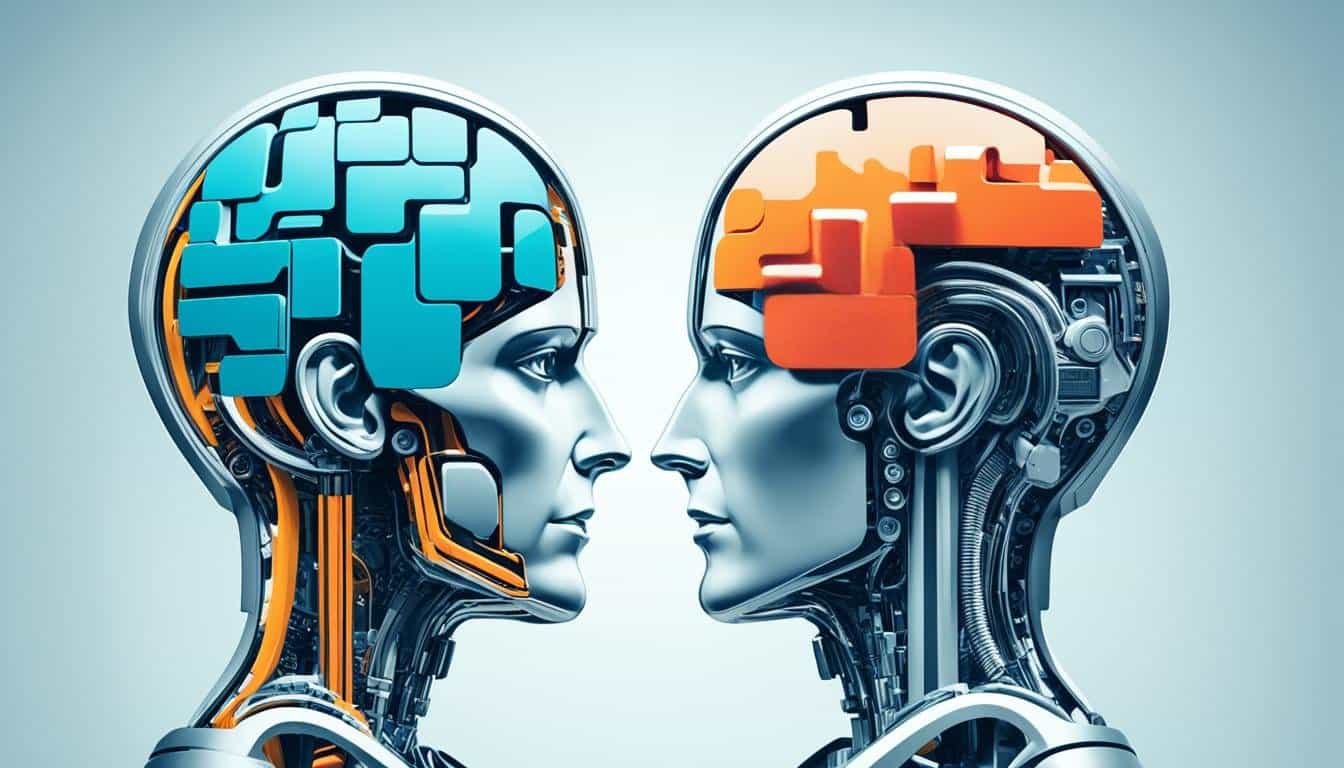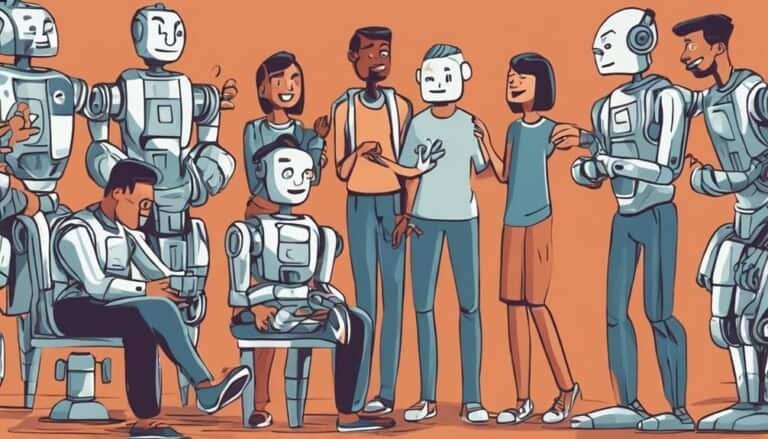AI and Misinformation: Addressing Consumer Concerns in the Digital Age
Did you know 76% of consumers worry about AI tools like ChatGPT and Google Bard spreading misinformation? This shows a big issue in our digital world where AI and misinformation are linked. Yet, over 65% of people would rather use AI than old search engines, showing a new way we get information. Also, even with worries, 65% still trust companies that use AI, showing we need to use AI responsibly to keep trust.
This balance between making customers happy and fighting misinformation is very important.
Key Takeaways
- 76% of consumers are concerned about AI-induced misinformation.
- 65% of people prefer using AI tools like ChatGPT over traditional search engines.
- Despite misinformation concerns, 65% continue to trust businesses using AI.
- Thousands of consumer submissions related to AI interactions were recorded in the past year by the Consumer Sentinel Network.
- Consumer issues like bias, copyright infringement, and privacy risks highlight the challenges of AI integration.
- The Federal Trade Commission (FTC) monitors the impact of emerging AI products to safeguard consumer interests.
AI and digital misinformation are real concerns, shown by thousands of consumer reports. These reports talk about issues like copyright infringement and privacy risks. The FTC is watching the market closely. Companies need to follow ethical AI practices. Knowing these things helps us use the digital world safely and responsibly.
Understanding AI and Its Integration into Daily Life
Artificial intelligence has become a big part of our daily lives. It helps us organize our schedules and gives us personalized recommendations. Let’s explore what artificial intelligence is and how it’s becoming a big part of our lives.
What is Artificial Intelligence?
Artificial intelligence (AI) means making machines think and act like humans. It’s not just for robots but also for tools that make everyday tasks easier.
The Growing Presence of AI in Consumer Tools
Many of us use AI tools every day without knowing it. Companies like Google and Microsoft use AI to make things easier for us. For example, AI in consumer tools like ChatGPT can search, answer questions, and even write emails for us.
Consumer Uses of AI: Text Messaging, Financial Advice, and More
AI does more than just simple tasks. It can help you with text messages or give you financial advice with tools like Mint. These daily AI applications are getting more popular. People like how AI gives quick, personalized help.
AI makes writing texts easier with predictive text. In finance, AI looks at how we spend money to give us advice. This shows how artificial intelligence integration touches many parts of our lives.
The Challenge of Misinformation in the Digital Age
Misinformation is a big problem in our digital world. Information moves fast and far, making it hard to keep up. People now worry about the harm it can cause and the loss of trust in institutions. We need to understand how misinformation spreads to stop it.
Defining Misinformation and Its Impact
Misinformation is false or misleading info that looks like fact. It can cause big problems, like people refusing needed treatments or losing money. It also hurts trust in media, government, and other groups when AI makes fake news.
The Role of Social Media Platforms
Social media is key in sharing info. Its algorithms focus on what grabs attention, which can spread false info fast. Big names like Facebook, Twitter, and YouTube are under the microscope for letting misinformation spread. They need to do more to stop it.
How Misinformation Spreads Online
Several things help misinformation spread online. For example, echo chambers keep people hearing only what they want to hear. And AI tools make it easy to make and share fake videos. Experts say this makes people keep making false content.
AI and Misinformation: Current Consumer Concerns
Artificial intelligence is now in many areas, causing more people to doubt AI. This is because of a big problem with AI-generated misinformation. A survey found that 80% of U.S. adults think false information and deepfakes will affect the next elections a lot. Also, 78% believe election candidates should not use AI-generated content.
AI-generated false articles have spread a lot, over 1,000 percent since May. Now, over 600 sites share misleading content. This has raised big AI concern trends.
Only 36% of people think brands should be near AI-generated content, according to a survey by IPG’s Magna. This view hurts how people see brands. Ads near false information are seen as less trustworthy.
Experts worry that intelligence agencies might use AI-generated news to influence elections. The California Artificial Intelligence Transparency Act (CAITA) was passed to make AI more transparent.
Here’s a look at some key stats on consumer worries about AI and misinformation:
| Concern | Statistic |
|---|---|
| Impact on Elections | 80% of U.S. adults believe it will have a significant impact |
| Opposition to AI in Campaigns | 78% think candidates shouldn’t use AI-generated content |
| Government & Tech Collaboration | 83% support joint efforts to tackle misinformation |
| Brand Trust Issues | Ads next to misinformation seen as less trustworthy |
| Growth of Misinformation Sites | Increased by over 1,000% since May |
AI-generated misinformation and doubts about AI have led to more rules and efforts by businesses and governments. These challenges show we need to use AI responsibly. This is to keep people trusting AI and protect true information online.
The Role of AI in Misinformation Detection
The digital age has brought us to a time where false information spreads fast online. Using AI to find and fight online lies is now key. This helps protect us from the dangers of misinformation.
Current AI Solutions for Detecting Online Disinformation
AI is helping fight the problem of false information. It uses tools like checking content authenticity and adding watermarks. These help prove where media comes from and fight fake news. The AI Governance Alliance pushes for strong rules and openness to reduce risks.
AI also tackles different kinds of false information, like harmful stereotypes. For example, false information aimed at women can cause a lot of harm. To fight this, we need teamwork from tech firms, lawmakers, and groups that help people.
Limitations and Challenges of AI in This Role
Even with its progress, AI has big challenges. AI can be biased, which means it might not always give correct info. The World Economic Forum warns about AI’s risks, like affecting how people vote and public trust.
Also, making AI better is an ongoing task. Researchers at the University of Queensland found that AI can spot fake news, but it needs updates to keep up with new ways of spreading lies.
To overcome AI’s limits, we need everyone involved. Making AI better means being open and ethical in how we use it. This ensures AI helps us all for the better.
Consumer Protection in the Age of AI
Today, consumer protection AI is key as AI becomes a big part of our lives. With 53% of US businesses planning to add more AI soon, we need strong strategies. These strategies must ensure accurate AI content and follow ethical rules.
Strategies for Ensuring Accurate AI-generated Content
We must create algorithms that focus on accurate AI content to fight misinformation. The Federal AI Governance and Transparency Act aims to make government work better with AI. It also cares about privacy and civil rights.
As scams and data privacy worries grow, we need good labeling and content tracing. This way, people can tell what’s AI-made and what’s not. It helps make sure folks get trustworthy info.
The Importance of Transparency and Ethical Use
Being open and ethical with AI is a must. The AI Bill of Rights and an Executive Order on AI safety push for clear AI use. People want ethics in AI, with 65% backing federal rules like those for data privacy.
This shows that AI transparency and ethics are key to building trust in AI.
| Statistic | Percentage |
|---|---|
| US businesses planning to integrate more AI | 53% |
| Consumers used generative AI in the past year | 35% |
| Consumers supporting federal regulation of AI | 65% |
| Top concerns: scams/fraud | 54% |
| Top concerns: data privacy risks | 47% |
| Top concerns: misuse with ill intentions | 46% |
| Top concerns: misinformation | 46% |
Digital Literacy: Empowering Consumers Against Misinformation
In today’s digital world, learning about digital literacy is key. It helps people fight against false information. By teaching people about AI and how it can spread lies, we can make a smarter public.
Join us on Tuesday, April 16, 2024, from 5:00 pm to 6:00 pm EDT. Brittney Smith and Peter Adams from The News Literacy Project will lead an insightful session. Smith teaches life science to diverse students, and Adams teaches and researches. They’ll talk about why knowing about media literacy is crucial.
The News Literacy Project is a nonprofit that teaches people to be smart news consumers. They offer programs and resources for teachers and the public. This session will cover how to spot and check AI-made content.
Both presenters are experts in their fields:
- Brittney Smith: Has a degree in biological science from the University of Cincinnati and a teaching degree from Mount St. Joseph University. She’s also working on a doctorate in education at the University of South Carolina.
- Peter Adams: Got his degree in English and African American studies from Indiana University and a master’s in humanities from the University of Chicago. He has taught in Chicago schools and at Roosevelt University.
Libraries are big on digital literacy and fighting fake news. They teach people about AI-made content. Working with schools, universities, and local media makes these efforts stronger.
It’s important to teach people how to check online info. Media literacy helps people tell real news from fake. Libraries are places where people can learn this, making them key in the digital age.
Addressing Job Displacement Fears Linked with AI
As AI gets better, people worry about losing their jobs. A survey found 77% of people think AI will lead to job loss in the next year. These fears are making people talk about how to help workers who might lose their jobs.
Survey Data: Job Loss Concerns Among Consumers
There’s real worry about losing jobs to automation. Many workers are scared of the changes AI will bring. For example, human resource leaders are now using AI in many areas:
- 78% of HR leaders use AI for managing employee records.
- 92% of HR leaders plan to increase AI use in performance management, payroll processing, recruitment, and onboarding.
This change has made many people worried about losing their jobs. It’s important to see that these fears are based on real changes in the workplace due to AI.
Suggested Interventions: Reskilling and Job Transition Support
To deal with AI job displacement fears, we need to act. We should focus on reskilling and supporting workers in their job transitions. Here are some ideas:
- Reskilling Programs: Training current employees for jobs that are needed in the AI market.
- Job Transition Support: Helping workers move to new roles where AI has less impact.
| Intervention | Description |
|---|---|
| Reskilling Programs | Training employees in areas unaffected by AI advancements. |
| Job Transition Support | Providing assistance for employees shifting to new roles. |
In countries like Germany and Canada, reskilling programs and government support have helped workers adjust. These efforts show how we can help workers in other places too.
Building Trust in AI Technologies
Building trust in AI technology is both exciting and challenging for companies. They aim to innovate and reassure consumers about AI’s reliability and ethical use. Big tech firms like Google and Microsoft show this commitment through strategic frameworks that focus on trust and tech advancements.
To keep AI credible, we must tackle concerns about synthetic media and AI-generated misinformation, like deepfakes. These threats can harm trust in digital media. Media groups are key in shaping AI trust. They should use these technologies wisely to keep public trust high.
Initiatives like those of Microsoft and OpenAI with AARP and International IDEA are creating new ways to educate people about AI. This helps build confidence in AI across different areas.
Teaching people about AI is vital for solving trust issues and making the most of AI’s benefits. As AI changes industries, it’s important to retrain workers and develop new skills. Public talks involving developers, users, and others are needed to address concerns like job loss from AI.
The Norwegian Center for AI Innovation (NorwAI) focuses on understanding what industries need for safe and responsible AI. Their workshops show that aligning goals and values is key to trusting AI technologies. For trust, AI systems must be ethical, technically strong, overseen by humans, transparent, and explainable.
Partnerships between tech companies, AI developers, and media are crucial for keeping trust in AI. Projects like Google’s AI for Social Good and Microsoft and OpenAI’s Societal Resilience Fund show a commitment to using AI for good. By focusing on these areas, companies can build confidence in AI and ensure it’s used ethically and credibly.
The Positive Potential of AI in Enhancing Consumer Experience
AI has a huge positive impact on making consumer experiences better. Companies like Home Depot, JPMorgan Chase, Starbucks, and Nike show that making experiences smooth and personal is key. They use AI to make sure customers feel heard and valued.
AI for Improved Customer Support and Communication
AI is changing how companies talk to their customers. Big tech companies use AI to understand what customers want. This helps new brands like sweetgreen and Stitch Fix offer unique experiences.
Even small companies like Brinks Home use data and AI to stand out. They’ve been doing this since 1994, competing with big names like ADT and Google Nest.
| Company | AI Enhancement |
|---|---|
| Home Depot, JPMorgan Chase, Starbucks, Nike | Personalized omnichannel experiences |
| sweetgreen, Stitch Fix | Data-driven customer engagement |
| Brinks Home | Comprehensive product usage and transaction data analysis |
AI-driven Personalization: Customizing Consumer Interactions
AI makes personalizing customer interactions possible. Even though many don’t fully understand AI, most think it can make their online experiences better. This personal touch makes customers more engaged and happy.
But, 77% of people still want a human touch in their customer service. Being open about how AI is used builds trust. Brands that use AI wisely and explain it can meet and beat customer expectations, making experiences better with AI.
Global Perspectives on AI and Consumer Sentiment
Artificial intelligence (AI) is becoming part of our daily lives, but people’s feelings about it vary around the world. It’s key for businesses to know how people in different places feel about AI. They need to understand the mix of excitement and worry people have.
Case Studies from Different Markets
In places like India, Brazil, and the United Arab Emirates, people are really into AI. For example, over 90% of people in India and the UAE know about ChatGPT. They’re using AI for things like texting and getting financial advice.
In China and Saudi Arabia, more than 80% of people are familiar with AI. This shows they’re open to using AI in many parts of their lives. This makes these markets a big deal for AI companies.
Insights from Surveys Conducted in Diverse Regions
Surveys show that 67% of people might choose AI tools like ChatGPT over regular search engines. But, 76% worry about AI spreading false information. Also, 65% trust companies that use AI, but 7% are still unsure.
In the US, 74% think companies should be responsible for AI chatbot mistakes. In Great Britain, Australia, and Hong Kong, people also want businesses to make sure AI info is reliable. These findings highlight the importance of ethical AI use to build trust and address concerns.
Source Links
- Consumers Are Voicing Concerns About AI
- Misinformation reloaded? Fears about the impact of generative AI on misinformation are overblown | HKS Misinformation Review
- AI Misinformation: Concerns and Prevention Methods
- The Ethical and Social Impact of Artificial Intelligence
- Understanding AI-Generated Misinformation and Evaluating Algorithmic and Human Solutions
- Combating Misinformation in the Digital Age: Rebuilding Trust in Science and Healthcare – Highlight
- AI-Generated Misinformation: A Growing Challenge in the Digital Age
- AI and the spread of fake news sites: Experts explain how to counteract them
- AI Briefing: How AI misinformation affects consumer thoughts on elections and brands
- The rise of AI fake news is creating a ‘misinformation superspreader’
- How AI can also be used to combat online disinformation
- How AI is being used to fight fake news
- Detecting fake news and disinformation using artificial intelligence and machine learning to avoid supply chain disruptions
- AI regulation is in the works, with strong consumer support
- Consumer Protection Law and AI (Chapter 5) – The Cambridge Handbook of Private Law and Artificial Intelligence
- Executive Order on the Safe, Secure, and Trustworthy Development and Use of Artificial Intelligence | The White House
- AI, the Digital Landscape, and Misinformation-Busting Superpowers for Students – edWeb
- Libraries Can Fight AI-Misinformation with Media Literacy Education
- Report Finds Workers Anxious About AI Taking Their Jobs – PSHRA
- AI in the workplace – Addressing Fears & Embracing Opportunities
- Building Trust in AI: The Crucial Role of Education and Partnerships
- Building trust in AI
- Customer Experience in the Age of AI
- Turning potential to profit: building consumer trust in AI
- 3 in 4 consumers believe AI can have a positive impact on their experience
- Over 75% Of Consumers Are Concerned About Misinformation From Artificial Intelligence
- Consumers Know More About AI Than Business Leaders Think
- Consumers hold companies responsible for AI chatbot errors







